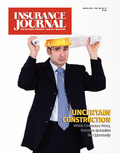Influential Chinese companies that want to avoid competition are the biggest threat to more economic reform in China, U.S. Treasury Secretary Henry Paulson said Thursday.
Paulson’s comment echoed complaints by foreign investors that Beijing is trying to shield its companies by raising barriers to investment in insurance and other industries and hampering the foreign acquisition of Chinese corporations.
“I think the biggest threat to more reform in China is the strong domestic industry that doesn’t want competition,” Paulson told reporters as he wrapped up a two-day visit.
The secretary lobbied Chinese leaders earlier to open state-dominated financial markets wider to foreign competition and cut tariffs on imports of environmental technology.
The American and European chambers of commerce accuse Beijing of violating free-trade commitments by blocking access to banking and other financial industries to shield Chinese companies. The government insists it is abiding by its agreements but says it wants to create national economic champions in oil, banking and other industries.
Beijing still welcomes foreign investment, and the total rose 38.3 percent in February from a year ago to US$6.9 billion (euro4.5 billion), according to the government. But investors complain that acquiring an existing company in China is more difficult than it has been in at least five years, due partly to opposition from Chinese competitors.
On Wednesday, Paulson said the U.S. credit crisis might be making Chinese leaders hesitant about further financial reform. He said Thursday they were closely studying the impact on Wall Street but said he did not want to speculate about how they might react.
Paulson was in Beijing to prepare for a June meeting of a U.S.-Chinese high-level dialogue meant to address tensions over China’s soaring trade surplus and defuse demands by American critics for punitive action.
In a speech earlier Thursday at a government think tank, he called for closer cooperation on energy conservation and for Beijing to cut import duties on environmental technology.
Washington and Beijing agreed in December to cooperate over the next 10 years on climate change, energy security, promoting sustainable use of natural resources and other environmental issues. The United States and China are the world’s top two oil consumers.
“U.S. and Chinese institutions need to manage the new demands of energy and environmental issues in innovative ways,” Paulson said.
Paulson met with Premier Wen Jiabao, who affirmed Beijing’s commitment to the U.S.-Chinese Strategic Economic dialogue.
“It can not only enhance out mutual trust but solve problems and difficulties in our economic and trade ties,” Wen said. “The mechanism can also set the long-term direction for our economic cooperation and design the details, and therefore it’s of great importance.”
On Wednesday, Paulson met Chinese President Hu Jintao and Wang Qishan, Beijing’s new point man on trade ties with Washington. Paulson calls Wang, a former star Chinese banker, a friend and says their relationship should help smooth the transition in the dialogue following the retirement of his predecessor, Vice Premier Wu Yi.
In the speech Thursday, Paulson said Beijing had to liberalize financial markets for the good of its own people.
“A deep and more efficient financial sector will help Chinese households earn a higher return on their investments and thus achieve their financial goals,” he said.
Referring to China’s efforts to curb inflation by freezing retail prices of gasoline and diesel, Paulson warned that the United States ran into problems in the 1970s with price caps that led to heating oil shortages and rationing.
“China, by setting price controls on fuel, is facing similar consequences today” with widespread shortages, he said. “And because market forces can never be completely eliminated, price controls often lead to smuggling and corruption.”
Paulson said China could benefit from importing technology to improve energy efficiency, reduce greenhouse gas emissions and supply cleaner water. But he said that is hindered by high tariffs and other import barriers.
“A high priority should be given to eliminating tariffs and non-tariff barriers on products, goods and services that can improve the health and welfare of the Chinese people,” he said.
Was this article valuable?
Here are more articles you may enjoy.


 DeSantis Signs Law Giving Condo Owners Some Relief, But Questions Remain
DeSantis Signs Law Giving Condo Owners Some Relief, But Questions Remain  US E&S Growth Slowed Again in ’24; Berkshire, AIG Top Premium Rankings
US E&S Growth Slowed Again in ’24; Berkshire, AIG Top Premium Rankings  Hedge Fund Strategy Built on Catastrophes Taps a Hot New Trend – Parametrics
Hedge Fund Strategy Built on Catastrophes Taps a Hot New Trend – Parametrics  As Hurricane Season Picks Up, Key Forecasting Tool Access Set to End
As Hurricane Season Picks Up, Key Forecasting Tool Access Set to End 

